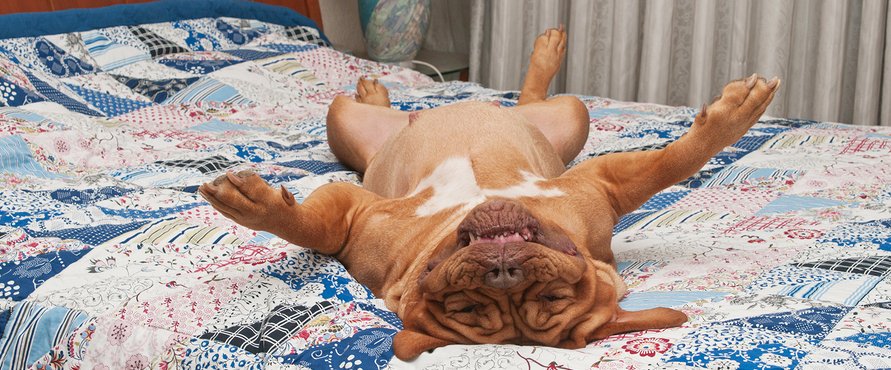Most of us who own a dog consider our pet to be a full-fledged member of the family. Our pups are included in our holiday photos, are given special treats all the time, and receive presents on their birthdays. They reciprocate, of course, by being sources of unrequited love, and we feel lucky to have them in our lives. But when togetherness time with the family pooch also means sharing a bedroom, which for many pet owners it does, are you putting your sleep quality at risk? According to new research, that may depend on exactly where your furry friend is doing that snoozing.
The study, which took place at the Mayo Clinic Sleep Disorders Center in Phoenix, Arizona, found that people who allow their dogs to sleep in their bedroom don’t sacrifice sleep quality unless their dogs share the bed with them.1 Patel, Salma I.; et al. “The Effect of Dogs on Human Sleep in the Home Sleep Environment.” Mayo Clinic Proceedings. September 2017. Accessed 17 September 2017. http://www.mayoclinicproceedings.org/article/S0025-6196(17)30486-X/fulltext. The results were based on an investigation in which 40 adults who had no sleeping disorders were tracked for a period of five months to assess their canine’s effects on their slumber. All of them typically slept with their dog in their room, either on the floor or in their bed.
For seven of the nights of the experiment, the subjects and their dogs each wore an activity monitor to get detailed information on their sleeping habits. The researchers measured each subject’s sleep efficiency, which is the percentage of time between going to bed and getting up in the morning that is actually spent sleeping. A sleep efficiency rating of 80 to 84 percent is considered satisfactory, 85 to 89 percent is standard, and 90 or above is highly efficient, and therefore most desirable.
The participants who slept with their dogs in their rooms somewhere other than the bed had an average sleep efficiency level of 83 percent. Those whose dogs shared the bed with them had an average sleep efficiency level of 80—not a huge difference, and both are within the satisfactory range.
However, when their sleep quality was evaluated, a major discrepancy arose. The people whose dogs slept in their beds woke up significantly more often during the night compared to their peers whose dogs were on the floor. While they might have fallen back to sleep quickly, there is no mistaking that broken sleep can take a major toll. In fact, a 2014 study at Tel Aviv University in Israel showed that interrupted sleep is as physically detrimental as getting just four consecutive hours of sleep.2 Kahn, Michael; et al. “Effects of one night of induced night-wakings versus sleep restriction on sustained attention and mood: a pilot study.” Sleep Medicine. 30 April 2014. Accessed 18 September 2017. http://www.sleep-journal.com/article/S1389-9457(14)00157-9/fulltext. In the short term, this may decrease attention span and cognitive ability as well as adversely affecting mood. And over the long term, chronic sleep deprivation of this kind is associated with an increased risk of obesity, cardiovascular disease, and diabetes.
Plus, there are additional safety issues to consider when deciding whether to allow your pup to share your bed. Diseases that your dog may carry can be transmitted to you. Some, such as bubonic plague, may still be rare in much of the United States, but do exist in regions like the Midwest and West. More common conditions, such as Lyme Disease, are rampant in many heavily wooded areas, and the ticks that carry it can easily move from your dog’s body to yours.
Of course, that’s not to say that it can only happen if Fido is in your bed; it’s equally likely to occur just sitting together for a cuddle. And that brings up yet another danger of being very close to your dog, which is permitting them to lick your face. There are infections you can catch from dog saliva including worms, clostridium, E. coli, and salmonella. Then again, simply petting a dog was found in a 2004 study at Wilkes University in Wilkes-Barre, Pennsylvania to improve immune system function.3 Charnetski, Carl J.; et al. “Effect of Petting a Dog on Immune System Function.” Psychological Reports. 1 December 2004. Accessed 18 September 2017. http://journals.sagepub.com/doi/abs/10.2466/pr0.95.3f.1087-1091.
So, while the jury may still be out on whether it is truly safe to let your dog sleep in your bed from a disease-related perspective, it seems to be fairly evident that based on the need for adequate sleep, you are better off relegating your canine companion to a doggy-bed on the floor. Even though the current study was very small in size, the findings are really basic common sense. We all know that somehow dogs both large and tiny usually end up taking up your space in bed and the result is less slumber for you.
References
| ↑1 | Patel, Salma I.; et al. “The Effect of Dogs on Human Sleep in the Home Sleep Environment.” Mayo Clinic Proceedings. September 2017. Accessed 17 September 2017. http://www.mayoclinicproceedings.org/article/S0025-6196(17)30486-X/fulltext. |
|---|---|
| ↑2 | Kahn, Michael; et al. “Effects of one night of induced night-wakings versus sleep restriction on sustained attention and mood: a pilot study.” Sleep Medicine. 30 April 2014. Accessed 18 September 2017. http://www.sleep-journal.com/article/S1389-9457(14)00157-9/fulltext. |
| ↑3 | Charnetski, Carl J.; et al. “Effect of Petting a Dog on Immune System Function.” Psychological Reports. 1 December 2004. Accessed 18 September 2017. http://journals.sagepub.com/doi/abs/10.2466/pr0.95.3f.1087-1091. |












I would be interested in
I would be interested in seeing a similar study done on sharing the bed with another person. My husband ( who passed last Oct.) snored, talked in his sleep, and often did the restless leg movements. He woke me repeatedly every night. Now I sleep with two small dogs, both sleep soundly and quietly and have yet to wake me. Better yet, they are warm and comforting to sleep with.
Dogs, twitch and snore
Dogs, twitch and snore also…. and they have the parasites, not that a human does not….
to Health and Sleeping